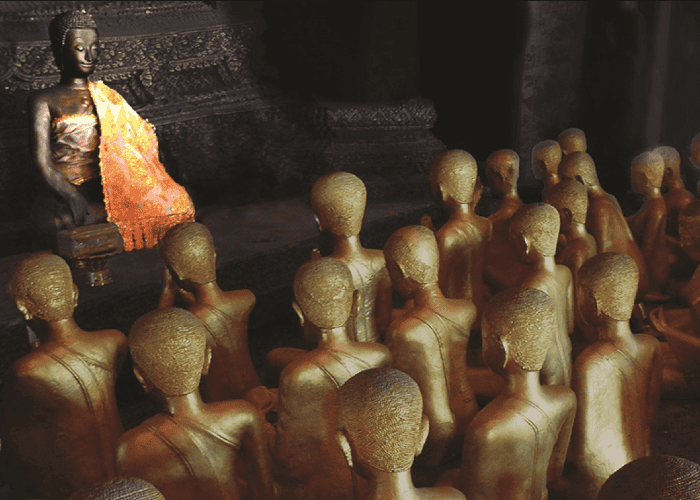Verse 58: The slippery slope of worldly gain
Part of a series of talks on Gems of Wisdom, a poem by the Seventh Dalai Lama.
- Do Buddhists have ambition?
- We can never get enough material wealth, praise, or fame
- Rather than worldly ambition, Dharma ambition
Gems of Wisdom: Verse 58 (download)
“What is the mountain on which the faster one climbs, the faster one slips back?”
Audience: Ambition
Venerable Thubten Chodron: Actually, ambition’s a very good answer to that. He says here, “Worldly possessions that are spent as quickly as they are laboriously acquired.” But that’s a form of ambition, isn’t it? Acquiring worldly possessions.
What is the mountain on which the faster one climbs, the faster one slips back?
Worldly possessions that are spent as quickly as they are laboriously acquired.
I like the answer of “ambition.” There are different kinds of ambition. Somebody once asked me, “Does a practicing Buddhist have ambition?” And it made me stop and think. You know, there are different kinds of ambition. There’s the kind of ambition that’s usually talked about here—I want to acquire a lot of material possessions, or I want to get famous, or I want to have a lot of power, or that kind of ambition. But also, if you look at ambition as having a very clear goal and going about achieving it, then you could say Buddhists have ambition. Or spiritual people in any tradition could have ambition, if you define it that way: having a very clear goal and going after that. Because here your goal is something spiritual.
Ambition usually refers to a more mundane goal, though, doesn’t it? How to get rich, or famous, or powerful, make a name for myself, blah blah blah. But it is like a mountain, because the more you climb up, the more you slip back, because you’re never going to get to the top of that one.
I mean, the example of material possessions is a good one because you get something, or you get some money, and then you use it up and you spend it as quickly as you get it. And my goodness, people nowadays have a problem with this hugely, don’t they? You know?
Remember years ago…. What did they do when you saved up for something at the store? Layaway plans, where you had to save, and then you got the article. Now it’s you get the article, and you put it on your credit card, and then you try and find a way to pay it. Yes? Which is an excellent example of climbing up the mountain and slipping back. Because you wind up really having less. Because when you pay the interest on the credit card the thing winds up costing a fortune. And then it breaks and you have to pay to repair it. So you’re really losing out in many ways.
The same thing…. Your wealth, you spend it as soon as you get it. But if you look at trying to get powerful…. You do all these things to get powerful, but once you’re engaged in playing that game, you’re playing it with other people who are also trying to be powerful, and so you wind up getting involved in a lot of backstabbing, and one-upmanship, and so on, to the point where you never feel like you have the kind of power you want. And you think, “Oh, well if I get elected as—” whatever you’re trying to get elected to, then you’re powerful. But if you’ve studied the fourth chapter of Aryadeva’s 400, you know, he talks there about how a leader is completely dependent upon the person they’re leading. And you can see this. You think: “Oh, the President of the United States is so important.” Actually, he’s totally dependent on the other people in the government, and is hog-tied right now by what’s going on. So, in name you have power…. You know, how much do you have?
And then he said he was even going to do things out of presidential power, but then he can’t do that because of risk of what might happen at the election. So, youhen you’re playing that game of trying to get power, you can never get the power you want.
Same with fame. If you’re climbing the mountain of getting fame, you know, you get one thing and you’re noticed, you get another thing and you’re noticed, but then how long can that continue, because pretty soon other people—like magazines and so forth—they don’t stay with one person.
Like, there’s some big baseball guy who’s just retired. He was like on the front page of the New York Times for like two days, and then gone. Nobody’s going to remember him. (I’d never heard of him before.) This kind of thing of getting famous. You climb the mountain but then … you dissolve back into where you came from.
So, rather than have ambition for the mountain of fame and power and material possessions, have something for the Dharma.
Sometimes we have that same thing about being popular. Or being loved. Like lots of people say, “Oh, I don’t want to be famous.” Isn’t popularity a type of being famous? “I want everybody in my group to know me, and to talk about me well.” You’re not famous in the news, but in your own little group, you know, being popular means that everybody’s thinking about you. Okay?
Or we climb the mountain of love. “I want everybody to love me.” And, you know, trying to get more and more love, more and more love, and of course you become so possessive and so obsessed with being loved that after a while people can’t stand to be with you, because all you want to do is talk about the relationship.
You remember those days? Yes? “Well, we’ve got to talk about the relationship, honey.” [rolls eyes] “Again!”
Yes, sometimes you have to talk about the relationship, but at a certain point it’s like, “Ugh, can we talk about something else?” You know? Because there’s such a hunger to climb the mountain of love, and get more and more love, that after a while, you know, you’ve just slid back. Haven’t you?
Or, like the hikers on that mountain in Japan that recently became a volcano and they got covered in ash. You climb the mountain of whatever your ambition is, it blows up, and then you suffocate from the ash.
Nothing to trust in worldly success. So give it up.
[In response to audience] So this was a famous actress—or comedian, yes—who died. And before they would take her out of the hospital she had to have her hair done, her nails painted, and make-up put on, and then a nice faux mink thing put on top of her so that she looked beautiful at her funeral. She couldn’t even get to the mortuary. Wow. She was 81, but the recipient of a lot of plastic surgery.
She must have had that in her will, or something, that a family member carried that out—before she could even leave the hospital room.
Some people are very attached to what happens to the body after they die. You know, if you look in “The Ten Innermost Jewels of the Kadampa” there are lots of discussion there about giving up attachment to what happens to your body after you die. But many people are quite attached to that. You know? Like we saw when the plane blew up over the Ukraine, they wanted to get even the remains of—you know, an arm, a leg—of their loved one’s body, as a symbol of that person, to bury it properly. As if the body were the person, and you know, it gives you something to hang onto.
Making a corpse look gorgeous. But this is what embalming is all about. I mean, this is not really unusual. I remember when I was in college one of my friends’ mother died. I didn’t look at the corpse, but I heard people afterwards saying, when they viewed her, “Oh, I haven’t seen her look so good in a long time.”
Venerable Thubten Chodron
Venerable Chodron emphasizes the practical application of Buddha’s teachings in our daily lives and is especially skilled at explaining them in ways easily understood and practiced by Westerners. She is well known for her warm, humorous, and lucid teachings. She was ordained as a Buddhist nun in 1977 by Kyabje Ling Rinpoche in Dharamsala, India, and in 1986 she received bhikshuni (full) ordination in Taiwan. Read her full bio.


